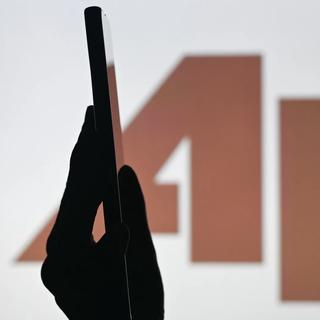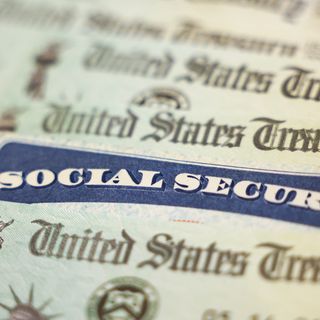Normal view
-
Latest News
- An OpenAI exec says she was diagnosed with breast cancer and that ChatGPT has helped her navigate it
An OpenAI exec says she was diagnosed with breast cancer and that ChatGPT has helped her navigate it

CFOTO/Future Publishing/Getty Images
- Kate Rouch, OpenAI's chief marketing officer, said she was diagnosed with breast cancer.
- Rouch said she is expected to make a full recovery and urged other women to prioritize their health.
- She said she leaned on OpenAI's ChatGPT to navigate her treatment.
Kate Rouch, the chief marketing officer at OpenAI, shared on Friday that she was diagnosed with invasive breast cancer weeks after assuming the role, which she called her "dream job," in December.
In a thread posted on X, Rouch said she was sharing her story to help other women, adding, "We can't control what happens to us--but we can choose how we face it. My biggest lesson: no one fights alone."
Prior to joining OpenAI as the company's first CMO, Rouch was CMO at Coinbase and, before that, spent over a decade at Meta, including as vice president, global head of brand and product marketing.
Rouch said she started treatment right around the Super Bowl in February, when OpenAI aired its first-ever ad, and that she has since gone through 13 rounds of chemotherapy while leading OpenAI's marketing team. She wrote that she is expected to make a full recovery.
"It has been the hardest season of life — for me, for my husband, and for our two young children," Rouch said, adding she has been supported by OpenAI "at every step."
"Silicon Valley can be brutal and transactional. And yet — I've never felt more held," she said, adding that "people showed up in incredible and unexpected ways."
Rouch also said OpenAI's ChatGPT has helped her navigate her diagnosis and treatment, including by explaining cancer in a way that is age-appropriate for her kids, helping her manage the side effects of chemo, and creating custom meditations.
"Experiencing our work as a patient has made OpenAI's mission feel more personal and important," she said.
Rouch said she was sharing her story to encourage other women to "prioritize their health over the demands of families and jobs."
"A routine exam saved my life. It could save yours, too," she said.
Business Insider reached out to OpenAI for comment.
Kevin Weil, the chief product officer at OpenAI, expressed support for Rouch in a reply to her thread.
"We love you @kate_rouch!" he wrote. "Proud of you for telling your story and for being so full of fight."

Browns Predicted to Pull Off Bold Quarterback Trade
Egg Recall Map Shows Warnings Issued to Customers in 9 States
-
Latest News
- Trump's trade talk delegation is set to face off with China's negotiators in London. Here is what's at stake.
Trump's trade talk delegation is set to face off with China's negotiators in London. Here is what's at stake.

KEYSTONE/EDA/Martial Trezzini/via REUTERS
- Top Trump officials are meeting Chinese negotiators in London on Monday.
- This would be the first official US-China talk since a temporary tariff truce on May 12.
- International trade experts have said that Trump could be under pressure to strike a deal.
Three top Trump administration economic officials will face off against Chinese negotiators in a renewed effort to break the US-China trade deadlock.
Secretary of the Treasury Scott Bessent, Secretary of Commerce Howard Lutnick, and Trade Representative Jamieson Greer will be meeting China's delegation in London on Monday.
"The meeting should go very well," President Donald Trump wrote in a social media post announcing the talks.
This coming meeting will be the first official talk between the two countries since they mutually lowered tariffs in a temporary truce on May 12, after talks in Geneva.
The renewed talks follow a 90-minute phone call between Trump and China's leader Xi Jinping on Thursday, a rare direct conversation that Trump later described as "very good." According to Trump, the two leaders also agreed to visit each other in person, without providing more details in terms of a timeline.
The Chinese Embassy of Washington did not respond to a request for who would be attending this negotiation from its side. The team they sent to Geneva consisted of Vice Premier He Lifeng, Vice Commerce Minister Li Chenggang, and Vice Finance Minister Liao Min.
Notably, Li has a Master of Laws from the University of Hamburg in Germany and has been part of China's delegation to the World Trade Organization since 2021.
International trade experts previously told Business Insider that much is at stake for both China and the US to strike a deal, or at the very least, continue the truce beyond August 12 when the 90-day tariff pause will expire.
"The Trump administration made their job harder because the tariff policies they've implemented are costly to Americans and American companies, and therefore, the market doesn't like it," said Philip Luck, director of the CSIS Economics Program. "They are under a lot of pressure to do things fast."
Meanwhile, a lawsuit that threatens to undo all of Trump's tariffs enacted under the IEEPA also looms over negotiations with China.
Drew DeLong, lead in geopolitical dynamics practice at Kearney, a global strategy and management consulting firm, told BI that if the court strikes down tariffs before trade deals could come to pass, other routes of imposing tariffs could be more complicated and time-consuming.
The White House did not provide Business Insider with any additional comment beyond Trump's Truth Social post.

Lakers' LeBron James Strongly Urged to Retire By Former NBA Big Man
Howard Lutnick says bananas — a tropical fruit — should be grown in the US

Leah Millis/REUTERS
- Secretary of Commerce Howard Lutnick clashed with a congresswoman over where bananas can be grown.
- The president's April tariffs include a 10% baseline on all imports, which is driving up grocery prices.
- Much of the US lacks the tropical climate that bananas would need to grow.
The Secretary of Commerce and a Congresswoman just clashed over whether bananas can and should be grown in the US.
"There's no uncertainty if you build in America and you produce your product in America, there will be no tariff," Howard Lutnick told Rep. Madeleine Dean of Philadelphia during a House hearing on Thursday morning.
Dean was saying that for her constituents in suburban Philadelphia, Trump's tariffs would cause at least a $2,000 a year price increase on goods. She specifically called out the price of bananas and said Walmart has already hiked the price of the fruit by 8%.
"We can't produce bananas in America," the Democratic congresswoman responded.
"The concept of building in America and paying no tariff is very, very clear," Lutnick said.
"We cannot build bananas in America," Dean repeated.
Large-scale banana farms are not viable in much of the US. However, bananas are grown in Hawaii and in parts of Florida, and can be grown in other parts of the Southern United States. In 2023, Hawaii produced 4.73 million pounds of the fruit, according to the Department of Agriculture.
Rep. Dean's office did not immediately respond to a request for comments.
The debate over bananas took place over a House hearing about trade deficits and the uncertainty Trump's tariff plan has caused since its rollout in April.
Under Trump's April 2 tariffs, a 10% baseline tariff applies to all goods imported into the US, including bananas. Though additional higher tariffs on trading partners are currently on pause for a limited time, some additional tariffs apply for products from China, as well as for imports of all steel and some other categories of metals.
Banana plants thrive in tropical regions with average temperatures of 80°F and a recommended relative humidity of 70 to 80%, according to EOS Data Analytics. The data company that provides crop monitoring services also wrote that farmers grow most bananas within a 30-degree range north and south of the equator.
According to figures from the American Farm Bureau Federation, in 2023, Guatemala supplied 40% of bananas consumed in the US by value, followed by Ecuador and Costa Rica, each contributing 16%.
Walmart and the Department of Commerce did not immediately respond to a request for comments.

How to Watch BKFC 75 Albuquerque Mundell vs. Sanchez: Live Stream BKFC, TV Channel
Orioles Reunite With Veteran Reliever In Trade With Braves
Neighbors Find Dog Tied Up to a Tree, by Evening 'They Knew' the Truth
Longtime Aaron Rodgers Teammate Gets Cold Feet About Joining Steelers: Report
Fan-Favorite AEW Star Gives Positive In-Ring Return Update
John Force Racing Announces Collaboration For New Philanthropic Initiative
State Department considers giving $500 million to the new Gaza Humanitarian Foundation
The State Department is discussing allocating $500 million for funding of the U.S. and Israel backed Gaza Humanitarian Foundation (GHF) that has been delivering food to Palestinians in Gaza in recent weeks, a U.S. official and a source with direct knowledge told Axios.
Why it matters: If the U.S. goes ahead with this massive funding, it will become the biggest donor to the foundation and will de facto "own" the operation.
- While such a move will increase the U.S. credibility in asking other countries to donate money to the foundation, it would also draw the U.S. deeper into active involvement in the Gaza war and make it more responsible for the humanitarian situation in the enclave.
- Without funding from foreign governments, the GHF will have difficulty operating in the coming months. Israeli officials asses that the GHF needs around $100 million a month to continue delivering aid in Gaza.
Driving the news: In recent weeks, the GHF launched a new mechanism aimed at delivering aid to Palestinian civilians without Hamas taking control of or getting credit for it.
- The GHF and Israeli officials say hundreds of thousands of Palestinians have already received food, medicine and other supplies at the aid sites.
- But over the last week, two mass casualty events took place near the aid centers. In one of the incidents, the IDF confirmed that it fired at Palestinians who were on their way to the aid distribution center.
Zoom out: In several other incident, the distribution centers were overwhelmed by the number of people who came to receive aid.
- The shooting and the chaos led the GHF to suspend operations for 24 hours on Wednesday and ask the Israeli military to take steps to avoid similar incidents.
- The UN and other aid organizations who refuse to cooperate with the GHF have warned for weeks that exactly these kind of incidents would result from civilians needing to pass through IDF lines to reach the newly established aid centers.
Behind the scenes: A U.S. official said that State Department officials who oppose the U.S. funding of the GHF are concerned about the U.S. becoming responsible for future mass casualty incidents around the aid distribution centers.
- Those who support the idea on the other hand claim that U.S. funding means more U.S. ability to improve the humanitarian situation on the ground.
- A U.S. official said the idea of funding the GHF has been discussed in working levels within the State Department and Secretary of State Marco Rubio and president Trump, who will have to make this decision, hasn't been briefed about it yet.
- "It will probably happen next week and until then we will see if the situation stabilizes and there are no more incidents and then we will decide," the U.S. official said.
Reuters first reported the discussions in the State Department on possible U.S. funding for GHF.
- The State Department did not respond to requests for comment.
Between the lines: The funding on the GHF has been kept under a veil of secrecy by its senior leaders and by the Israeli government.
- A senior Israeli official said the GHF secured $100 million to launch its operation. The money came from foreign governments and from private sector donors who all asked for anonymity, the Israeli official said.
- Israel's public broadcaster Kan reported earlier this week that the Israeli government has given more than $200 million to the GHF in a secret appropriation to the ministry of defense without revealing where the money will go to. The Israeli prime minister's office denied Israeli tax payer money was given to GHF.
- Udi Levy, the former head of the Mossad's economic intelligence unit, told Israel's channel 12 last week that Qatar and Turkey are funding GHF. The Qatari and Turkish governments denied that. But the Israeli military censor ordered channel 12 to delete the interview from its website.


Appeals court allows White House AP ban to continue
A panel of judges from a U.S. federal appeals court on Friday said parts of the White House's ban on the Associated Press could remain, dealing a devastating blow to the AP.
Why it matters: Press freedom advocates are closely watching the AP's case for any precedents it could set around free speech protections for journalists.
What they're saying: In a statement, the AP said, "We are disappointed in the court's decision and are reviewing our options."
- White House press secretary Karoline Leavitt called the ruling a victory in a post on X.
- "As we've said all along, the Associated Press is not guaranteed special access to cover President Trump in the Oval Office, aboard Air Force One, and in other sensitive locations," she wrote.
Catch up quick: The AP sued three Trump administration officials in late February for blocking its reporters from events like Oval Office meetings and Air Force One press pools, citing a violation of its First Amendment rights.
- The White House said it barred the AP for refusing to change the term "Gulf of Mexico" to "Gulf of America" in its journalism. The AP said it didn't make the change so as not to cause confusion amongst its global readership.
- A judge rejected the Associated Press' emergency motion to rescind the White House ban shortly after he sought more details on the circumstances surrounding the case.
- In April, a federal judge sided with the Associated Press, declaring that under the First Amendment, the government can't bar journalists from certain government events because of their viewpoints.
- The Trump administration appealed the federal judge's ruling shortly thereafter.
How it works: The recent decision allows most of the White House's ban of the AP to go back into effect while the case is still litigated.
- The White House barred AP reporters from presidential spaces like the Oval Office and Air Force One.
- The panel of three judges — two of which were Trump appointees — ruled that those spaces aren't subject to First Amendment protections, but allowed a lower court ruling that said the White House must allow access to larger spaces, like the East Room, to the AP.


DOGE given access to Americans' Social Security data by Supreme Court
DOGE employees can access millions of Americans' sensitive Social Security data, the Supreme Court ruled Friday in a party-line decision.
Why it matters: The ruling is a win for the Trump administration, which has charged the Department of Government Efficiency with rooting out alleged waste and fraud at the Social Security Administration.
- The unsigned majority opinion overturns a 9-6 decision from the entire Fourth Circuit that upheld a lower court's decision to temporarily block DOGE from accessing the data.
- U.S. District Judge Ellen Hollander, who issued the initial stay, had questioned why DOGE needed "unprecedented, unfettered access to virtually SSA's entire data systems."
Friction point: The Supreme Court's three justices appointed by Democratic presidents voted to prevent DOGE from accessing the Social Security data until lower courts had a chance to resolve legal challenges.
- Justice Ketanji Brown Jackson wrote a dissent joined by Justice Sonya Sotomayor that chastised the Supreme Court for once again issuing an emergency order in favor of the Trump administration without the benefit of a briefing or oral argument.
What they're saying: "In essence, the 'urgency' underlying the Government's stay application is the mere fact that it cannot be bothered to wait for the litigation process to play out before proceeding as it wishes," Jackson wrote.
- "[O]nce again, this Court dons its emergency-responder gear, rushes to the scene, and uses its equitable power to fan the flames rather than extinguish them," Jackson wrote.




